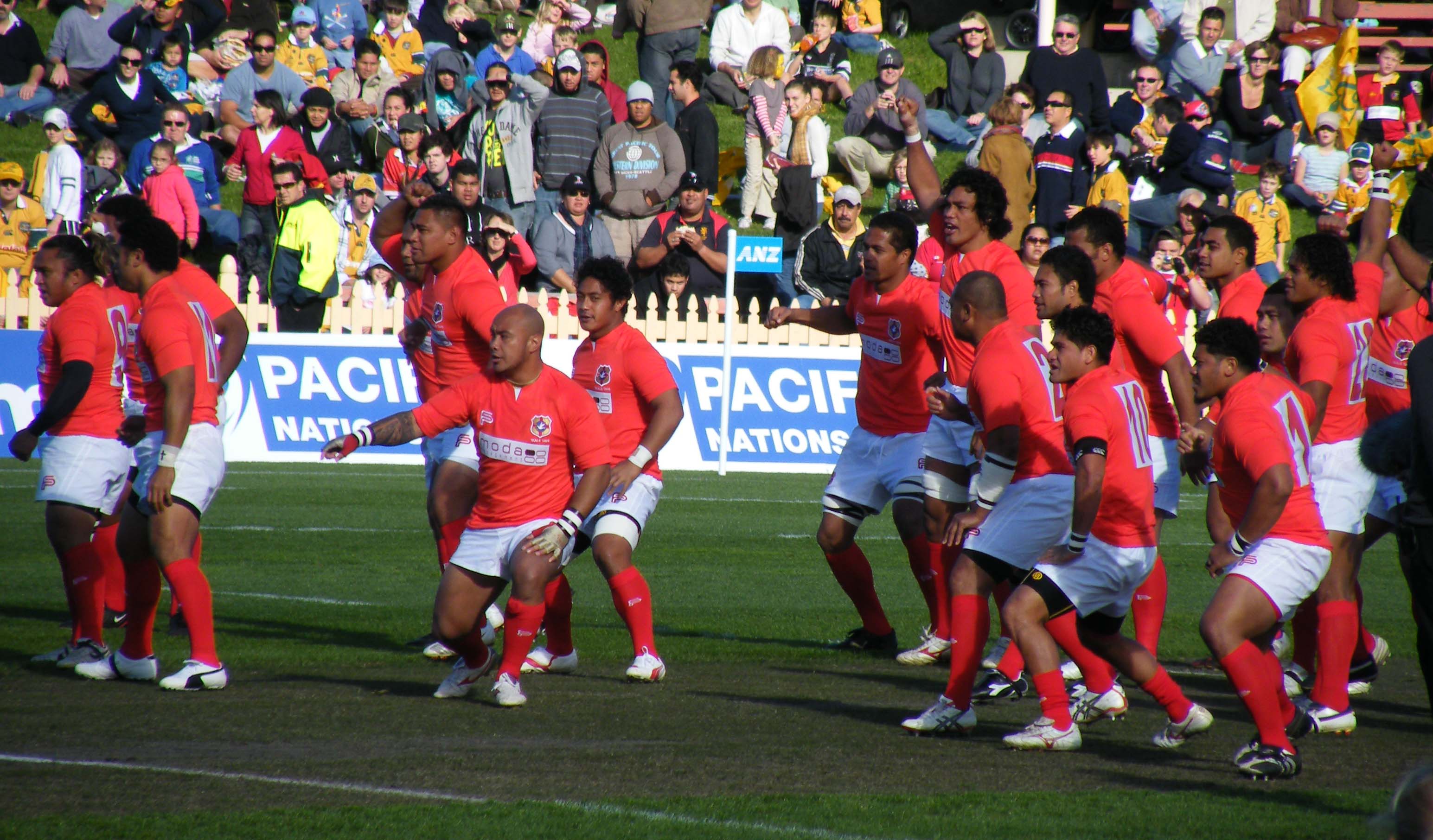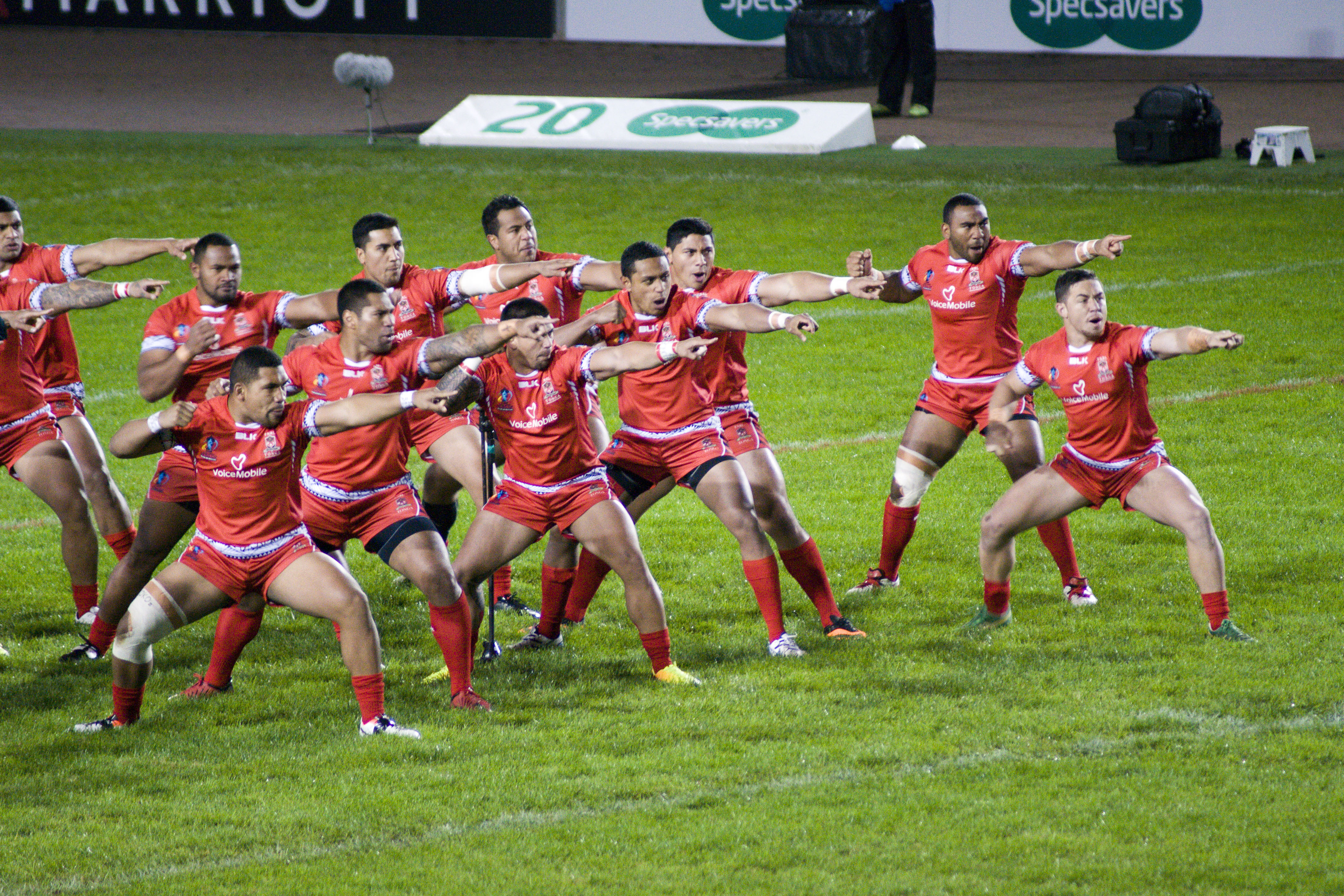Kailao on:
[Wikipedia]
[Google]
[Amazon]
The kailao is a cultural dance from the South Pacific country of
 The
The



 The Tonga rugby union national team's pre-game challenge, the Sipi Tau was penned by King Tama Tu'i Tāufaʻāhau Tupou IV in 1994, but its origins can be traced back much further. In Tonga in the pre-1800s there were no challenges before war. Indeed, talking was considered a sign of weakness in battle. But in the 19th century a war dance was introduced from the neighbouring Wallis and Futuna Islands and Tonga quickly annexed it.
There have been several different Sipi Tau used by the Tongan rugby team over the years, but it is unsure when they were first used in rugby. The latest one was composed in honour of a short, successful tour of New Zealand in 1994. The current words were first used in the
The Tonga rugby union national team's pre-game challenge, the Sipi Tau was penned by King Tama Tu'i Tāufaʻāhau Tupou IV in 1994, but its origins can be traced back much further. In Tonga in the pre-1800s there were no challenges before war. Indeed, talking was considered a sign of weakness in battle. But in the 19th century a war dance was introduced from the neighbouring Wallis and Futuna Islands and Tonga quickly annexed it.
There have been several different Sipi Tau used by the Tongan rugby team over the years, but it is unsure when they were first used in rugby. The latest one was composed in honour of a short, successful tour of New Zealand in 1994. The current words were first used in the
:'Ei e!, 'Ei e!
:Teu lea pea tala ki mamani katoa
:Ko e 'Ikale Tahi kuo halofia.
:Ke 'ilo 'e he sola mo e taka
:Ko e 'aho ni teu tamate tangata,
:'A e haafe mo e tautua'a
:Kuo hu'i hoku anga tangata.
:He! he! 'Ei e! Tu.
:Teu peluki e molo mo e foueti taka,
:Pea ngungu mo ha loto fita'a
:Teu inu e 'oseni, pea kana mo e afi
:Keu mate ai he ko hoku loto.
:Ko Tonga pe mate ki he moto
:Ko Tonga pe mate ki he moto.
Tonga
Tonga (, ; ), officially the Kingdom of Tonga ( to, Puleʻanga Fakatuʻi ʻo Tonga), is a Polynesian country and archipelago. The country has 171 islands – of which 45 are inhabited. Its total surface area is about , scattered over in ...
. It originates from Wallis and Futuna
Wallis and Futuna, officially the Territory of the Wallis and Futuna Islands (; french: Wallis-et-Futuna or ', Fakauvea and Fakafutuna: '), is a French island collectivity in the South Pacific, situated between Tuvalu to the northwest, Fi ...
.
History
The kailao originated on the island collectivity ofWallis and Futuna
Wallis and Futuna, officially the Territory of the Wallis and Futuna Islands (; french: Wallis-et-Futuna or ', Fakauvea and Fakafutuna: '), is a French island collectivity in the South Pacific, situated between Tuvalu to the northwest, Fi ...
, where it is still performed in public ceremonies. In Tonga it is performed at public and private ceremonies. The men, bearing stylized clubs (pate kailao), dance in a fierce manner that emulates fighting, to the accompaniment of a beaten slit drum or tin box which sets the tempo. Unlike most other Tongan dances, it is performed without singing. The sequences of movements are called by the lead dancer, who calls out the names of the sequences and signals when to do them. They can involve mock combat between dancers, changes in formation, and tricks involving the pate kailao themselves. The moves display the dancers' discipline, obedience, and skills with their weapons. A similar Rotuma
Rotuma is a Fijian dependency, consisting of Rotuma Island and nearby islets. The island group is home to a large and unique Polynesian indigenous ethnic group which constitutes a recognisable minority within the population of Fiji, known as ...
n dance, also derived from the 'Uvean original, is similarly called the ''ka'loa''.
 The
The 'Ikale Tahi
The Tonga national rugby union team ( to, timi feohi ʻakapulu fakafonua ʻa Tonga) represents Tonga in men's international rugby union. The team is nicknamed ''Ikale Tahi (Sea Eagles)''. Like their Polynesian neighbours, the Tongans start ...
, the Tongan national rugby union team, used to perform the kailao with kailao clubs or sticks, as they did against Wales in 1974. In the 1980s, they stopped performing the kailao and switched to the ''sipi tau'', which is performed without sticks, as it was considered more appropriate for the non-ceremonial setting.
Sipi Tau



 The Tonga rugby union national team's pre-game challenge, the Sipi Tau was penned by King Tama Tu'i Tāufaʻāhau Tupou IV in 1994, but its origins can be traced back much further. In Tonga in the pre-1800s there were no challenges before war. Indeed, talking was considered a sign of weakness in battle. But in the 19th century a war dance was introduced from the neighbouring Wallis and Futuna Islands and Tonga quickly annexed it.
There have been several different Sipi Tau used by the Tongan rugby team over the years, but it is unsure when they were first used in rugby. The latest one was composed in honour of a short, successful tour of New Zealand in 1994. The current words were first used in the
The Tonga rugby union national team's pre-game challenge, the Sipi Tau was penned by King Tama Tu'i Tāufaʻāhau Tupou IV in 1994, but its origins can be traced back much further. In Tonga in the pre-1800s there were no challenges before war. Indeed, talking was considered a sign of weakness in battle. But in the 19th century a war dance was introduced from the neighbouring Wallis and Futuna Islands and Tonga quickly annexed it.
There have been several different Sipi Tau used by the Tongan rugby team over the years, but it is unsure when they were first used in rugby. The latest one was composed in honour of a short, successful tour of New Zealand in 1994. The current words were first used in the 2011 Rugby World Cup
The 2011 Rugby World Cup was the seventh Rugby World Cup, a quadrennial international rugby union competition inaugurated in 1987. The International Rugby Board (IRB) selected New Zealand as the host country in preference to Japan and South Af ...
.
Tongan (current words)
Sipi Tau a'e 'Ikale Tahi :''Teu ke tau!'' (Leader) :''Tonga!'' (Team) :''Teu lea pea tala ki mamani katoa'' :''Ko e Ikale Tahi kuo halofia.'' :''Ke ilo e he sola mo e taka'' :''Ko e aho ni te u tamate tangata,'' :A e haafe mo e tautuaa'' :''Kuo hui hoku anga tangata.'' :''Ei!'' (Leader) :''E!'' :''Ei!'' (Leader) :''E!'' :''Te u peluki e molo mo e foueti taka,'' :''Pea ngungu mo ha loto fitaa'' :''Ngungu!'' (Leader) :''Io!'' :''Ngungu!'' (Leader) :''Io!'' :''Ko Tonga pe mate ki he moto'' (Leader) :''Otua mo Tonga ko hoku tofi'a '' :''Ei e!'' (Leader) :''TONGA!''English Translation (current words)
:Leader:Get ready to the battle! :Team:Tonga! :I shall speak to the whole world :The Sea Eagles are famished unfurl. :Let the foreigner and sojourner beware :Today, destroyer of souls, I am everywhere :To the halfback and backs :Gone has my humanness. :Leader:Hey! hey! :Ay! :Leader:Aye! :Aye! :Maul and loose forwards shall I mow :And crunch any fierce hearts you know :Leader:Crunch! :Yeah! :Leader:Crunch! :Yeah! :That's how Tonga dies to her motto :God and Tonga are my inheritance. :Leader:Aye, ay! :Tonga!English translation (old words)
:Aye, ay! Aye, ay! :I shall speak to the whole world :The Sea Eagles are famished unfurl. :Let the foreigner and sojourner beware :Today, destroyer of souls, I am everywhere :To the halfback and backs :Gone has my humanness. :Hey! hey! Aye ay! Zap. :Maul and loose forwards shall I mow :And crunch any fierce hearts you know :Ocean I drink, fire I dine :To death or victory my will is fine. :That's how Tonga dies to her motto :To her motto Tonga gives all.Rugby League Sipi Tau
TheTonga national rugby league team
The Tonga national rugby league team ( to, timi līki ʻakapulu fakafonua ʻa Tonga) represents Tonga in rugby league football. They are currently the second ranked team in the world. The team was formed to compete in the 1986 Pacific Cup, a ...
uses a different Sipi Tau.
:Teu to ki he tupe!
:Ko e 'aho!
:Ko e 'aho mavava mo e tangi!
:Teu mate maa Tonga!
:Hi!
:Tonga 'e!
:Ta ke hu ki ai!
:Katoa pe!
:Taha!
:Mo e to kotoa!
:Teu fetau folau!
:Hi! Ha!
:Mo e pese!
:Mo e lea!
:'Otua ke tau!
:Tau malohi!
:'Ai Malohi!
:Tau Fefeka!
:'Ai Fefeka!
:Tau ki Tonga!
:To'o mo e hi!
:Tau mo tangi!
:'I 'olunga moihulo!
:Feinga te tau 'ikuna!
:'Ikuna kotoa!
:Hi!
This Sipi Tau is translated as follows:
:I will stomp the ground with a thunderous noise
:The day
:The day of clamor and howling
:My life for Tonga
:Yeah!
:O Tonga
:Behold, we make our entrance
:All of us
:As one
:Stomping in unison
:I will journey into battle
:Hee! Haa!
:In jubilation
:In speech
:O God, bless us that we may...
:Fight well
:Be strong
:Fight hard
:Be firm
:Fight for Tonga
:Take with you the "hee"!
:Fight and howl
:Towards the goal
:We must be victorious
:Victory all the way
:Yeah!
See also
*Haka of the All Blacks
The haka, a traditional dance of the Māori people, has been used in sports in New Zealand and overseas. The challenge has been adopted by the New Zealand national rugby union team, the "All Blacks", and a number of other New Zealand national t ...
*Cibi
The Cibi () is a Fijian meke of Bauan origin and war dance, generally performed before or after a battle. It came to prominence in the rugby field in 1939 when it was performed by the Fiji national rugby union team before the match. It is also k ...
*Siva tau __NOTOC__
The Manu Siva Tau is a Samoan war dance, performed by the Samoan sporting teams before each match.
The national rugby union team used to perform the traditional ' Maulu'ulu Moa' on tour. Prior to the 1991 World Cup, the 'Manu' war c ...
*Haka
Haka (; plural ''haka'', in both Māori and English) are a variety of ceremonial performance art in Māori culture. It is often performed by a group, with vigorous movements and stamping of the feet with rhythmically shouted or chanted accompa ...
*Hula
Hula () is a Hawaiian dance form accompanied by chant (oli) or song ( mele). It was developed in the Hawaiian Islands by the Native Hawaiians who originally settled there. The hula dramatizes or portrays the words of the oli or mele in a visua ...
References
{{reflist War dances Tongan culture Ritual dances Dances of Tonga Mock combat Rugby football culture